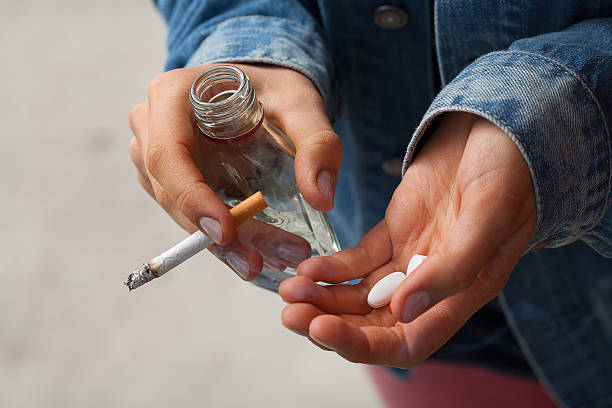Alcohol + Drugs: What Happens?

Alcohol in combination with other drugs can be deadly. Cases of drug addiction and overdose among the famous are reported frequently in the news. Elvis Presley died of an apparent heart attack, although he was taking “uppers”, “downers,” and mood changers in quantities that would have toppled a horse. Judy Garland, Marilyn Monroe, Truman Capote, Jim Morrison, Jimi Hendrix, Guru Dutt, Meena Kumari…the list of celebrities destroyed by alcohol and prescription drugs is long and heartbreaking.
The story hits the front page when celebrities get in trouble with drugs or die of drug/alcohol interactions. For each star, however, thousands of cases are never reported or are noted only on the obituary page. Anyone who drinks and takes tranquillizers or sedatives simultaneously is toying with a chemical time bomb that could explode into multiple addictions, multiple withdrawal syndromes, convulsions, coma, and death. One drink plus one pill does not equal the effect of two drinks or two medications. Instead, the potency of the drugs is multiplied three times, four times, or even more.
Research provides at least a partial explanation of why these explosive interactions occur. Alcohol and tranquillizing drugs compete for the same enzyme processing system in the liver. This is the system that metabolizes drugs, eventually eliminating them through the bloodstream. When alcohol is taken in combination with tranquillizers (or other drugs such as opioids), the enzymes are unable to work on both drugs simultaneously. Alcohol is always given priority, and the other drug must, in effect, wait in line for its turn to be processed and eliminated. This delay in normal processing causes the tranquillizing drug’s effects to be magnified since they are allowed to build up and remain active for a longer time.
Alcoholics are in danger when combining various drugs because their cells are already chemically altered by prolonged exposure to large doses of alcohol, which affects the cells’ reactions to other medicines.
The Danger of Cross-tolerance
The altered interaction is particularly noticeable with tranquillizers, sedatives, and other drugs that act as central nervous system depressants because their central nervous system cells are already tolerant to alcohol. Having adapted to one drug, their cells are also adapted to similar drugs. They must take more pills (or sniff or inject) more than prescribed to get the intended effect.
This instantaneous ability to withstand the effects of drugs pharmacologically similar to alcohol is termed cross-tolerance. It accounts for the alcoholic’s ability to continue to function with a tranquillizer or sedative doses, for example, which would be incapacitating or even lethal for non-alcoholics.
The dangers of cross-tolerance are obvious. Because of their increased tolerance, the alcoholic has to drink more to experience the desired effects of alcohol; if they take prescription drugs, they will have to increase the dosage to get the intended effect. Combined, these large drug doses are extremely dangerous, even for the alcoholic who can tolerate large quantities of each drug individually.
Moreover, alcoholics on medication are often too befuddled to medicate themselves according to directions. They may forget when or if they took the last pill, or they may double or triple the prescribed dose in an attempt to forestall the inevitable withdrawal symptoms. Accidental overdoses are frequent because alcoholics lose track of their intake of pills and alcohol.
Because drugs can partially substitute for alcohol in relieving withdrawal symptoms, and the symptoms of alcoholism mirror emotional disorders, and because many doctors who not aware of the cross-addiction process in alcoholics, sedatives and tranquillizers are often prescribed for alcoholics. While alcoholics may feel better temporarily after taking a sedative or tranquillizer, they will rapidly become addicted to the drug if they continue to take it.
If you or a loved one is struggling with addiction, call +91 7893003070 or 9849069609